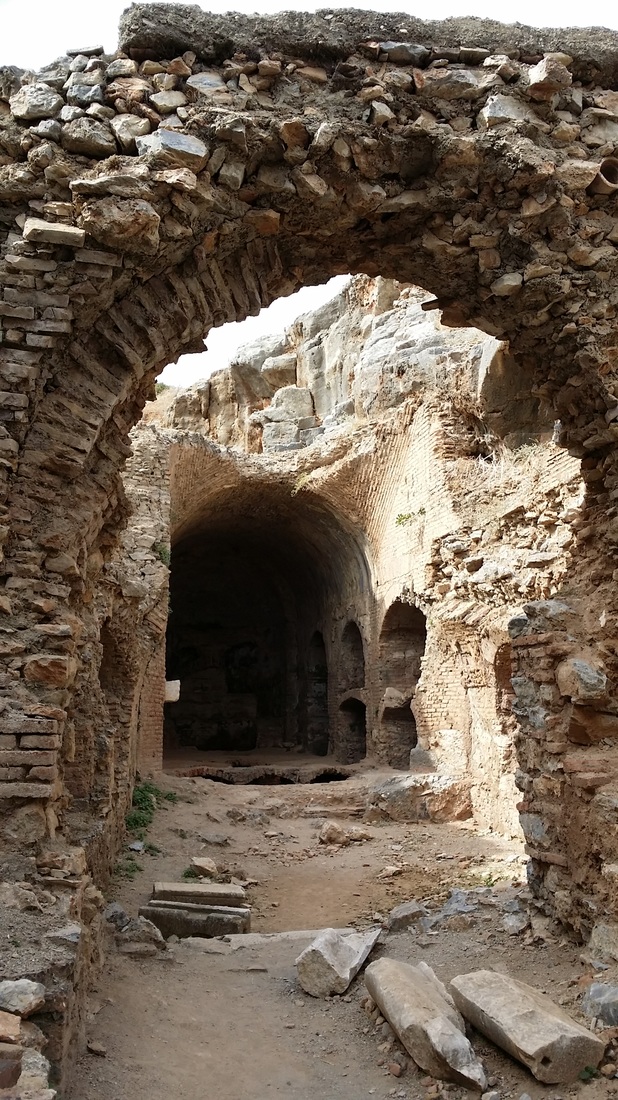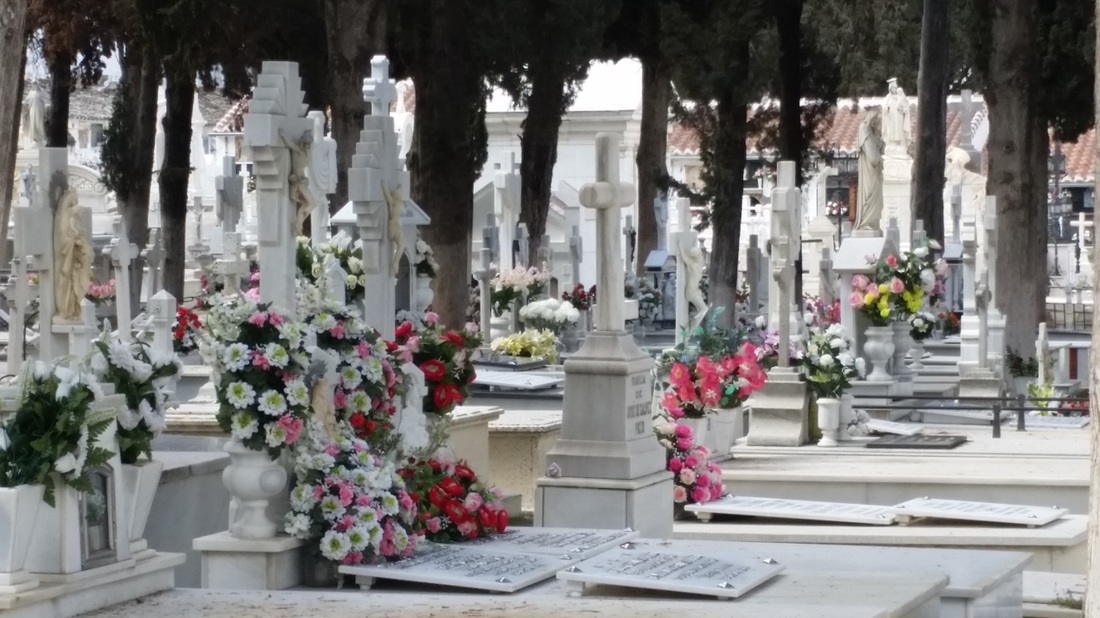|
Antonio* was the first friend we had when we moved to Antequera. We had met a couple of other people in those first few days, but Antonio was the guy who just enveloped us in happiness and hugs. He embraced us, quite literally with his giant bear hugs, and with his easy and quick friendship. We had been told, “Spaniards are a tough lot. You’ll never get close to them. You might become friendly acquaintances, but never true friends.” But we were having a tough time believing that with Antonio in our lives.
Antonio is this big teddy bear of a guy, a walking talking Santa Claus-type. Always smiling and joking around. Best friend to the world. Billy quickly fell right in with Antonio. They met several times a week for coffee or to do things in town. Antonio invited Billy in to his home (another thing we were told would never occur in Spain) to share stories and to help each other with language. Antonio became Billy’s language helper for Spanish, and Billy helped Antonio learn some English. Antonio has been a huge help to us in cultural matters – he is a trusted friend who will always tell us the truth, always tell us when we might be stepping in too deep, or alert us to cultural landmines that we could never have known without guidance. He introduces us to people, he invites us to picnics and cookouts, and he helps us get connected to opportunities to serve in our town. In our disciple group, Antonio is very attentive to the stories about Jesus’ treatment of the marginalized. He is highly participatory in our story discussions when it comes to lepers and the unclean and the unjust treatment of others. I have always been touched by his keen sense of understanding and compassion, and I have loved him for his tender heart during these studies. One week, as we studied another story about the unclean, specifically as it pertained to death, Antonio reminded the group of the modern day treatment in Spain of undertakers. Because our class is almost exclusively native Spaniards, this story was commonplace for them. They all knowingly shook their heads like it was just another story. But for me, it was new knowledge that rocked my world. Undertakers or morticians are considered unclean, still in this day and age. Those who deal with death are marginalized. When the undertaker goes in to a restaurant or café, there is a specific place for him to sit. He has a special set of dishes that are set aside for only his use. Because this is a small town, everyone knows the undertaker. When he arrives, he knows where to sit and the staff know to go and get the dishes that are reserved for only him. Even his glass and his silverware is set apart from the general public. This is 2016! This is a European nation, a ‘first world’ country! This was a huge shock to me. I kept my ‘learner face’ on and stayed in my cultural anthropological stance, but I was just dying inside. How could this be true today, in 2016? This is the kind of treatment that I know happens in developing nations and ‘3rd world countries’… but this is SPAIN! I worried on this story for a few weeks. I just couldn’t get over it. And my heart broke for Antonio… you see, my friend Antonio is an undertaker. For years, he has been the one who arrives at the hospital or at private homes to pick up the deceased and care for the body. He has been the one who has compassion in the darkest moments. He has been the one who goes to the funeral home, who does all that needs to be done in those hours between death and burial, and who sees to the final moments before loved ones say their last goodbyes. It is a tough job on even the best of days. Sadly, Antonio has been out of work since just before we moved here - a downsizing of funeral home staff in the middle of a major economic crisis put Antonio on the unemployment rolls, where he has been for 3 years now. It seems that it’s also difficult for a former undertaker to find a new job. Antonio never talks about that. He just continues to look for work. This past week, I asked Antonio if he would revisit that story with me – the story about the dishes and the marginalization of undertakers. Although he had not told the story in first person, I wondered. I asked him if that had applied to him, if he had lived that reality. “Yes. Yes, that story is my story,” he said. “That is the reality for undertakers.” A new wave of pain and compassion came over me. This is my friend, we are talking about. This is a part of his story that had never dawned on me. I could never have known to ask about it because it is so far from my culture and understanding that I would never have thought of it. I pushed on, “Antonio, what does that do to your heart?” A deep breath, then he softened and his body changed. He smiled a little, the smile of realizing that someone just saw through to your soul. He answered, “You have to make your heart hard. Hard so it won’t hurt.” His eyes brimmed with tears. “Obviously, it hurts, Antonio. Your heart is not hard.” “Yes, sometimes it hurts. People make jokes about me, off-handed things that are funny to them. Even friends tell jokes about me. I laugh and try to let it roll off. I try. But my wife – it is terrible for her. It hurts her deeply. She has never recovered from hearing people’s jokes and how people treat me.” Antonio’s wife has suffered years of debilitating clinical depression. Many days, she cannot leave the house. Antonio, too, suffers from depression and several related health issues. I’m seeing a much bigger picture of my friend and his heart. He goes on to tell me about other indignities of being the undertaker. Gas station attendants refused to wait on him or pump the gas at the full service pumps. They wouldn’t go near the hearse. The public shunned him and turned away when he was with the car. Even the dead merit more dignity than the living, breathing man who attends to them. My heart is so heavy for my friend. Jovial, peaceful, compassionate Antonio. To know the pain that he has felt, that he still feels. To now understand, to be able to see the mask that he wears with the world. To know that this precious man has been marginalized. Now I know why he is passionate about the Jesus who reached out to the unclean, the Jesus who touched lepers and had compassion for those who were shunned and cast out. Antonio is intimately and passionately in love with the Jesus who entered in to death, who had compassion for Lazarus, who touched the dead, who Himself was dead and experienced the tomb… and is now Alive. I’m honored to call the undertaker my friend. *Antonio’s name has been changed.
Meg Anderson-Brown
3/19/2016 07:45:55 pm
What a sweet, caring, and strong man! How could someone not become depressed in that sort of position? I know that those scriptures are like nectar to his soul.
Barbara Thorngren
3/30/2016 11:13:24 am
Our hearts go out to Antonio. We read your story with tears in our eyes. Our hearts told us to remember Antonio in our prayers. We have experienced the heartache of rejection first hand through our son's disabilities. Wouldn't it be wonderful to live in a world with people who have “Antonio’s" compassionate heart? Laurie, tell "Antonio" we will not forget him or his wife. Your article has made him a part of our family. Comments are closed.
|
Laurie DrumIn my USA life, I was a teacher in Texas for 15 years. I was also a professional photographer, a soccer mom, a horsewoman, and the neighborhood hospitality queen. I did "Joanna Gaines farmhouse style" before Chip and JoJo were even a thing - we restored an 1884 Victorian farmhouse in small town Texas and did shiplap walls until I thought I'd go crazy. I taught at NASA, scuba dived with astronauts in training, and studied animals at Sea World for educational purposes. I've tried just about everything, because I have an insatiable need to know if I can do it! Never underestimate a Texas girl in cowboy boots! In 2006, my husband Billy and I became cross-cultural workers (CCWs) with TMS Global. For five years, we served in three rural Quechua Wanca villages in the Andes of Peru. And when I say rural, I mean RURAL - like no potty! I spent my days in Peru learning to live a Quechua lifestyle in a rustic adobe house - cooking Peruvian foods, sewing with Quechua women, raising my chickens and goats and pigs, and planting my gardens. Now I live my life in small town Spain, serving other cross-cultural workers via teaching and training and care, and helping displaced people to navigate their new reality in Europe.
I'm passionate about fostering personal growth, growth in community, and growth in The Kingdom. Walking alongside others and helping them to use their unique design, their gifts and strengths and maximize their abilities to fulfill their God-given purpose - that's what makes my heart sing! Archives
March 2024
Categories |
What We Do About Us Media Contact Us
Copyright © 2013 ~ Billy Drum, 4717 Shoal Creek Dr., College Station, TX 77845 ~ 979.985.5238



 RSS Feed
RSS Feed

